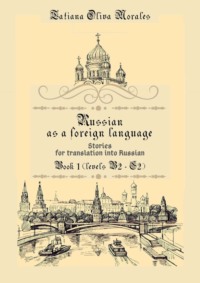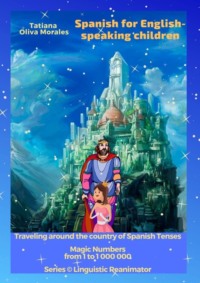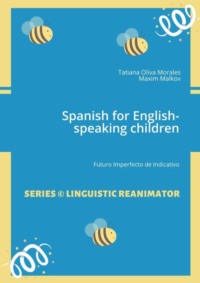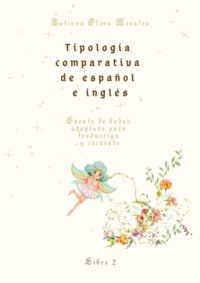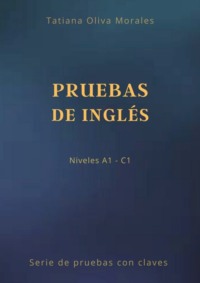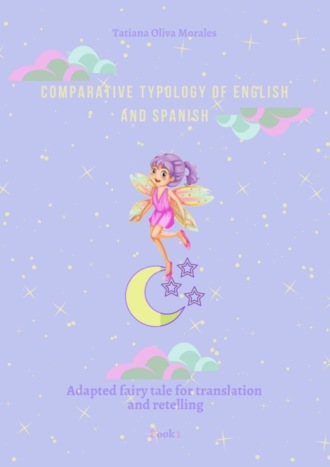
Полная версия
Comparative typology of English and Spanish. Adapted fairy tale for translation and retelling. Book 1

Comparative typology of English and Spanish. Adapted fairy tale for translation and retelling
Book 1
Tatiana Oliva Morales
Illustrator Tatiana Oliva Morales
Cover designer Tatiana Oliva Morales
© Tatiana Oliva Morales, 2020
© Tatiana Oliva Morales, illustrations, 2020
© Tatiana Oliva Morales, cover design, 2020
ISBN 978-5-4498-2134-8 (т. 1)
ISBN 978-5-4498-2135-5
Created with Ridero smart publishing system
Copyright
Copying the methodology in order to use this book for writing a manuscript of a study guide, namely: filing foreign / Russian words in brackets or over their corresponding Russian / foreign equivalents, marking up sentences with special notation as shown in this study guide; reprinting, reproduction by electronic means or by any other means of the entire book or any part of it is allowed only with the written permission of the author.
Annotation
The book consists of an exercise to translate an English fairy tale, adapted according to the methodology © Linguistic Reanimator, from English into Spanish; and 2 exercises for retelling of non-adapted English and Spanish versions of the same tale. Exercise 1 has the key. The tale contains 1142 English / Spanish words and phrases. By complexity, the book corresponds to levels B1 – B2. It is recommended for schoolchildren, as well as for a wide range of people studying English and Spanish.
The number of words you need to know for the following purposes of using a foreign language
For “survival” in an environment without a translator – 120
For daily communication on general topics – 2000
For reading simple texts of general subjects – 4,000 – 5,000
Reading difficult texts – 10,000
Native Speaker Level – 10,000 – 20,000
From the author
This book can be used as a tutorial. If you need additional consultations or classes, you can contact me. Consultations / classes in person or via Skype are possible.
My contact details
Tel 8 925 184 37 07
Skype: oliva-morales
E-mail: oliva-morales@mail.ru
Sites:
https://lronline.ru
http://www.m-teach.ru
Respectfully,Tatiana Oliva MoralesAbout the © Linguistic Reanimator series
All the English and Spanish language © Linguistic Reanimator Series books can significantly reduce the training period of a foreign language course and improve the quality of learning of new words and normative grammar by a student.
Their advantage is foreign words and (sometimes) transcription in brackets next to the word in a sentence. Using this technique, a student never studied English / Spanish before, having no vocabulary, can begin translating from Russian into English / Spanish, from Spanish into English or from English into Spanish.
The technique allows you to learn new English / Spanish words and phrases easily, and quickly; improving the skills of correct translation into a foreign language.
All the © Linguistic Reanimator Series books have been written for “my difficult students”, for those who needed to obtain a large amount of high-quality knowledge in a short period of time. The latter is the aim of all the textbooks of this series.
About the © Comparative typology of Spanish and English series
The © Comparative typology of Spanish and English series books are recommended for English and Spanish teachers or lecturers; for pupils, students, as well as for a wide range of people, learning Spanish and English languages at school, university or independently.
Highlighting
…-there should be a definite or indefinite article in this place.
! – you should consider what preposition should be in front of the next group of words.
* – irregular verb.
we (nosotros) – English word / its Spanish equivalent.
you (Usted) 2.read (leer) 1.it (lo) – the numbers in front of the words mean their order in the sentence.
your (-) – this word does not need to be translated into Spanish.
white houses (casa.. blanco..) – you should change gender and / or number of the words.
Exercise 1
Translate the fairy tale into Spanish.
2.Yogurt (de yogurt) 1.dreams (sueños)
Danya sat (sentarse) on (en) the windowsill (… alféizar) looking (mirar) at (-) the stars (… estrella..).

It was already late (ya ser tarde), high time to sleep (la hora de dormir), but (pero) he did not want (querer).
It (eso) happened (suceder) practically (prácticamente) every day (todos los días).
Mom and Dad (mamá y papá) were preoccupied (estar preocupado..) with (por) that (ese) issue (problema).
They consulted (consultar) the best (… mejor..) doctors (médico..) in the city (… ciudad),! the men of medicine (los hombres la ciencia médica).
They prescribed (recetar) various (vario..) pills (píldora..) and potions (poción..) to the (al) boy (… niño), but it didn’t work (eso no funcionar).
Just (justo) at that time (en ese momento) Danya’s grandmother (… abuela de Danya) came (venir) to visit them (a visitarles).
One late evening (una noche), when (cuando) Danya, instead of (en lugar de) going to bed (estarse acostado), was watching (mirar) the stars (… estrella..), she quietly (en silencio) entered (entrar en) the room (… cuarto), sat down (sentarse) in (en) the armchair (… sillón) and (y) asked (preguntar):
– Do you like (te gustar) the stars (… estrella..)?
– Yes (sí), granny, I really (realmente) love them (los amar), it seems to me (me pareccer) that (que) 2.there are (haber) 3.so (tanto..) many (-) secrets (secreto..) and (y) mysteries (misterio..) 1.in the night sky (en el cielo nocturno).
I like (me gustar) to look (mirar) at (-) the stars at night (por la noche) and dream (soñar).
– What (¿Con qué) do you 2.usually 1.dream (soñar / o – ue) of (-)?
– I don’t even know (Ni siquiera saber) how (como) to explain this (explicarlo), I just (solo) sit (sentarse / e – ie) and dream about (con) nothing (nada).
And my (mi) soul (alma) is so pleased (estar tan complacida) by it (por eso).
– But (pero) it’s probably (probablemente) not very interesting (no ser muy interesante) to dream about (con) nothing. – she wondered (dudar).
– Well (bueno), I apparently (aparentemente) didn’t mean it (querer decir otra cosa).
For example (por ejemplo), I’m looking (mirar) at (-) a star and (y) think (pensar / e -ie) what (como) it will be like (ser), if (si) you approach it (lo acercarse), what (que) happens (pasar) on (en) it (ella) and who (quien) lives
Конец ознакомительного фрагмента.
Текст предоставлен ООО «ЛитРес».
Прочитайте эту книгу целиком, купив полную легальную версию на ЛитРес.
Безопасно оплатить книгу можно банковской картой Visa, MasterCard, Maestro, со счета мобильного телефона, с платежного терминала, в салоне МТС или Связной, через PayPal, WebMoney, Яндекс.Деньги, QIWI Кошелек, бонусными картами или другим удобным Вам способом.


